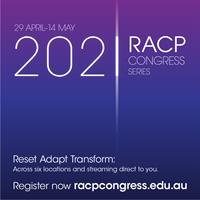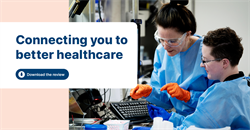The President's Message – 19 March 2021
We’re currently embarking on one of the most critical times in recent medical history… the rollout of the COVID-19 vaccine. It’s exciting to see the vaccine rollout is now underway in both Australia and Aotearoa New Zealand. Both countries are starting with border, quarantine and frontline workers to try and minimise ongoing COVID-19 risks in our community.
We have been actively advocating for a well thought out and well executed vaccine program. Last October we wrote to Australian Government Health Minister the Hon Greg Hunt. I’m pleased to say the Minister is implementing many of our suggestions including:
- improvements to the Australian Immunisation Register
- expansion of the AusVax Safety System to support vaccine safety
- the involvement of expert social scientists in communications and messaging to support the uptake of the vaccine
- development of a publicly available vaccine delivery plan.
The College’s COVID-19 Expert Reference Group continues to lead our policy and advocacy in this space. I’d like to thank the team, the staff and all involved for their work in this area.
The safety of our members and other health care workers is also of critical importance. Please know which vaccination group you will fall into and get yours as soon as you can. I was very happy to get mine recently, and I already have my second dose marked in my calendar. Please also support your friends, family and patients to know when it’s their turn, and encourage them to get their jab. We must improve herd immunity. We can be confident in our countries’ plans as well as the vaccines which have proven to be very effective in reducing serious disease.
Many of our members have been involved in various COVID-19 vaccine projects. Whether you’ve been involved in any of the approved vaccines, one that’s still in development, or even those that are still yet to make it – Thank you very much indeed for your involvement. It’s amazing to see what our community has achieved in such a short amount of time. Everything we’ve learnt from the pandemic will support us in future pandemics and like events. There’s also lessons for our health systems more broadly.
Speaking of what we’ve learnt… COVID-19 accelerated the use of telehealth across our countries. Here in Australia, the government has agreed to extend telehealth in it’s current form until at least the end of June. This is fantastic news.
So far, more than 51 million telehealth services have been delivered to 13 million patients in Australia. The government has committed to the ongoing role of COVID telehealth into the future and what form this will take will be discussed with peak medical groups including our College. More information about the vaccine rollout strategies in Australia and Aotearoa New Zealand as well as resources and RACP events is on our vaccination page on our website.
Professor John Wilson AM
RACP President
Congratulations to all trainees and Fellows who were awarded with an RACP Foundation Research Awards for 2021. A total of $2.2 million in funding has been awarded to 44 successful applicants from almost 250 applications received across the different award categories. These Awards are made possible through partnerships, bequests, gifts and donations received from RACP members and friends.
The RACP Foundation would like to express its appreciation for the Grants Advisory Committees from Australia and Aotearoa New Zealand and the many other invited and volunteer reviewers, for their time and expertise which makes the review process for these awards possible.
Find out more about the 2021 recipients from the below categories:

It is less than six weeks until RACP Congress 2021. If you haven't registered yet (especially for our face-to-face sessions), we recommend registering soon to secure your place.
Beyond the focus of our specialties, you will hear from experts across a range of interesting and current topics. You'll enjoy fascinating panel discussions, clinical updates and an action-packed program that will keep you motivated for weeks to come.
Some of the sessions include:
Advancing women in healthcare: This session is designed to provide a safe place for an open discussion on the challenges facing today’s society, as well as highlighting the positive changes being made and what the future could look like in an equitable working environment. For all of you who have an interest in the future of medicine, make some time for this.
Building a solution space for Indigenous health at the RACP: Transformations, challenges, and opportunities. Presented by two of Australia's foremost leaders in Indigenous health care and constitutional reform, Associate Professor Luke Burchill and Professor Megan Davis will speak of the challenges and opportunities as they seek to inspire other organisations to embark on their own journey of transformational change.
2020 Hindsight – What has really changed: The public health community offered a range of interpretations of data and divergent policy recommendations in 2020 and it is now possible to reflect on the health achievements, in terms of prevention, acute response and long-term management of COVID-19 and its associated health consequences.
Genetic discovery and translation in neuromuscular diseases: Dr Monkol Lek will speak about the importance of furthering our understanding of genetic mechanisms in known disease genes for translation into potential therapeutic approaches.
Register now

Dr Angus Ritchie is a Staff Specialist Nephrologist at Concord Repatriation General Hospital, Chief Medical Information Officer and Director of the Health Informatics Unit of Sydney Local Health District. He is a Clinical Senior Lecturer in the Faculty of Medicine, University of Sydney and is involved in nephrology and health informatics research. He has a Graduate Diploma in Health Technology Innovation and is a Fellow of the Australasian College of Health Informatics.
How has digital health transformed your work?
It is no longer possible to practice medicine without computers, software and the internet. To practice well, we need seamless access to clinical information anytime and anywhere. Simply listening over the phone is no longer sufficient – we need to see the ECG before activating the cath lab, view the brain CT to decide on thrombolysis and analyse the electrolytes before starting dialysis. Increasingly patients are collecting their own information and want it to inform our management plans.
What benefits does digital health have for you on a day-to-day basis, and the industry as a whole?
Technology is deeply impacting every area of medicine. Once physicians get over the hump in adopting electronic health records, they quickly see ways to make things safer and easier, and the pace of change accelerates. In some areas this can have strong positive impacts such as appropriate use of antibiotics, anticoagulants and opioids, and prevention of venous thromboembolism. The use of speech recognition instead of typing is already a game changer for early adopters. Even simple systems that we now take for granted, such as laboratory information systems can have a dramatic effect, which I have witnessed firsthand in Fiji over the last decade.
But we need to be mindful that electronic systems are data hungry and getting that information into the system has a price. Electronic medical records can increase cognitive load and fragment simple tasks, leading to inefficiency, fatigue, frustration and increased risk of burnout. Every decision about a new system needs to take these risks into consideration and ensure users are well trained and supported.
Can you please share a recent example of how digital health has helped you improve patient outcomes?
Virtual health care is a very exciting emerging area. It substitutes in-person consultations with telephonic or video consultations and includes asynchronous data collection from the patient via survey tools with or without real-time remote monitoring. My teams have had the privilege of working with RPAvirtual, Australia’s first metropolitan virtual hospital. We helped implement remote monitoring systems for COVID-19 and a wound photography application using AI to analyse and monitor wounds remotely. I have no doubt that virtual health care will have a major global impact on patient care and Australia is right at the leading edge of this innovation.
We are pleased to announce that on World Kidney Day (11 March 2021), the latest Evolve ‘Top-5’ Recommendations on low-value practices in nephrology were launched.
Kidney function and kidney disease impact human health across an array of systems and specialities. The new Evolve recommendations on low-value practices in nephrology span and interact with a wide range of conditions, populations and disciplines.
These recommendations apply to kidney function and disease in the context of patients with cardiovascular disease, paediatric urinary tract infections, diabetes and serious infections involving aerobic, Gram-negative bacteria and the bacteria that cause tuberculosis.
These systemic interactions are at the heart of these recommendations – it might appear somewhat arcane but applies across to a range of patients.
The newest Evolve Top-5 recommendations asks clinicians:
- not to give multiple daily doses of aminoglycoside antibiotics to patients with normal and stable kidney function as the risk of toxicity is less with a single dose
- not to use oral acetylcysteine before giving radiocontrast to patients at increased risk for contrast-induced acute kidney injury
- not to give routine prophylactic antibiotics to a child after the first urinary tract infection if at low risk of recurrent urinary tract infections
- not to intensively lower HbA1C<6.5 per cent to <8.0 per cent in patients with early (stage one to three) chronic kidney disease as intense lowering increased the risk of hypoglycaemia and mortality, noting that the individual target depends on factors such as severity of CKD, macrovascular complications, comorbidities, life expectancy and others
- not to prescribe aspirin therapy for primary prevention of cardiovascular disease in patients with stage one to three chronic kidney disease as there is no proven benefit and it is associated with increased risk of impaired haemostasis.
View latest recommendations

We understand there’s a lot going on at the College and that it can be difficult to keep informed about all of the upcoming RACP events. To help make life easier, we’re introducing a new monthly event digest, which highlights the key RACP events that are coming up in the next two months. It also helps you plan ahead, by saving the date for events that will be held later in the year.
We’re hosting more online events than ever before, which is a window of opportunity for you to virtually attend events from all over Australia and Aotearoa New Zealand. You will still be informed about RACP and industry events in our regular communications and can access the RACP events listing webpage at any time. This is a condensed monthly digest to make life easier for you.
You can expect to receive the event digest on the first Wednesday of each month, with the first one launching on Wednesday, 7 April. Keep an eye out for it, which will feature the above banner image. We hope this makes your life that little bit easier and we look forward to seeing you at our next event.
All Australian members are encouraged to attend this topical telehealth webinar held on Monday, 12 April at 7pm ACST Hosted by Avant Mutual, you'll understand your telehealth responsibilities, learn strategies to mitigate your risk, and hear some of the most common pitfalls and complaints.
Register now
Reimagining health post COVID-19: Reform for preventive, sustainable and equitable health
Despite the concerted efforts of physicians and other healthcare workers, the COVID-19 pandemic has highlighted key problems in the Australian health system and underscored persistent socioeconomic issues which influence the system and the health and wellbeing of Australians. It has crystalised the urgent need to reform the health system to make it more resilient and equitable, better prepared for current and future challenges and better able to deliver improved health and social outcomes for all Australians. The RACP’s submission to the Federal Budget 2021-2022, developed by the College’s Policy and Advocacy team in collaboration with our specialty and reference groups, addresses the most urgent and important amongst these issues.
Acknowledging the need to tackle the pressing issues stemming from the COVID-19 crisis, the submission asks that the upcoming Budget look longer term, and that allocations are made to address systemic issues over the period of forward estimates and beyond. We ask that the Budget aims to address the joint needs of investment in sustained health reform through better integration and futureproofing and in reinvigorated and targeted prevention efforts to better connect and support the national health system.
The constructive set of recommendations delivered to the Australian Government by the College is based on the experience of RACP members working across primary, community and hospital settings in the public and private sectors.
Read the submission
Physicians often fail to put on their own oxygen masks when dealing with the challenges and stresses that come with practising during a pandemic. This new online course explores in-depth how to better support your own wellbeing, as well as the wellbeing of your staff and colleagues through compassionate leadership. The course covers concepts, strategies, and tools to help you mitigate the impact, set healthy boundaries, prevent burnout, and build support networks during a crisis.
Enrol now
The Australasian Faculty of Public Health Medicine (AFPHM) is pleased to launch a new document titled ‘Public health physicians: Protecting, promoting and improving health for the whole community’. It articulates the value of public health physicians, credentialled as Fellows of the Australasian Faculty of Public Health Medicine (FAFPHMs), to the contemporary public health workforce and their capacity to contribute to the broader health system. This resource is intended to inform health system decision-makers in their strategic and workforce planning by describing the skills, expertise and roles of public health physicians.
It highlights that public health physicians ensure effective leadership, advocacy and better health outcomes by articulating that:
- public health physicians are medical specialists with a duty of care for populations rather than individuals
- public health physicians are trained to solve complex health problems and make sound evidence-based decisions at a systems-level. They are trained to lead complex change management including health promotion and disease prevention, systems reform, strategic planning and performance monitoring required to meet heath needs
- public health physicians lead policy reforms and interventions to transform population health in ways that are evidence-based and cost-effective
- protection of public health is a key role of government and public health physicians work across government portfolios.
The document clearly outlines the broad range of training, expertise and impact of public health physicians, including their unique skills in:
- leading, collaborating and finding solutions for complex population health challenges
- supporting populations and health systems
- integrating medical and public health expertise
- strengthening evidence-based health systems and public health interventions
- promoting equity in health policies
- ensuring statutory health protection and disease prevention.
Please note AFPHM are currently developing a suite of resources to accompany the document, including videos, an infographic and showcasing profiles of public health physicians.
Read now
This is an exciting time to become an RACP accreditor. We are rolling out the new accreditation standards and requirements for Basic Training in Australia and Aotearoa New Zealand. As an accreditor, your valuable contribution will ensure the delivery of high-quality workplace training and competent physicians, now and into the future. Expressions of Interest are open to all Fellows in the Adult Medicine and Paediatrics & Child Health Divisions.
As an accreditor, you will:
- undertake setting and training program accreditation reviews with peers
- play a crucial role in providing support and constructive feedback to settings who are seeking to achieve RACP accreditation as a training provider
- gain firsthand experience of the new accreditation Standards and Requirements in practice, providing you with valuable insight for future accreditation preparations in your organisation
- be eligible to claim Category 3 CPD credits and hours for activity undertaken.
Training with ongoing support and guidance to start your new role will be provided.
How to apply
Submit an Expression of Interest form along with your latest CV to accreditation@racp.edu.au (Australia) or accreditation@racp.org.nz (Aotearoa New Zealand) by Wednesday, 30 June 2021. For more information, contact us via the details provided above.
Fellows and trainees of all specialities are invited to enrol in this new Qstream course, which has a mid-May start. The course is designed to provide practical strategies to help you enhance your teaching skills and effectively balance teaching with a busy workload.
You'll access in-depth case studies with questions that are sent directly to your inbox at spaced intervals over a three-week period. Each question takes just ten minutes to complete, and participants are encouraged to discuss the case studies and share opinions with others through secure, online discussion forums.
The course is designed to enhance your knowledge in adult learning, provide practical strategies to incorporate effective teaching skills into day-to-day settings, and encourage self-reflection and peer discussion.
Enrol now
Are you a RACP Fellow or trainee who wants to be more involved in shaping Evolve? Consider joining the Evolve Policy Reference Group. The RACP regularly consults, collaborates and partners with Fellows and trainees in the Evolve Policy Reference Group. The group plays an important role in leading and shaping Evolve to make it more relevant and fit-for-purpose. Email evolve@racp.edu.au to find out more.
The Medical Council of New Zealand is holding elections for four medical members to join Council governance. On their behalf, we encourage all our members to please vote and help shape the direction of Te Kaunihera o Rata Aotearoa Medical Council of New Zealand. Voting for the elections for four medical members to join Council governance is open until Hui-tanguru, 26 Poutū-te-rangi l Friday, 26 March.
On 23 Hui-tanguru l 23 February, all registered doctors should have received an email from medicalcouncil@electionz.com with information about the 11 candidates, and a unique pin and password for voting online. Please read it and cast your vote today.
Find out more
 The need for healthcare providers to connect to each other safely and securely is greater than ever. Secure messaging is an efficient and timely method for sending and receiving clinical information, which minimises the burden of paper and manual processes. An increased uptake of secure messaging improves continuity of care for patients, saves time and can help protect vital health information.
The need for healthcare providers to connect to each other safely and securely is greater than ever. Secure messaging is an efficient and timely method for sending and receiving clinical information, which minimises the burden of paper and manual processes. An increased uptake of secure messaging improves continuity of care for patients, saves time and can help protect vital health information.
Safety and Quality Benefits of Secure Messaging
The content in this document has been derived from a review undertaken by the clinical safety program conducted by the Australian Commission on Safety and Quality in Health Care, on behalf of the Australian Digital Health Agency.
Download now (PDF)
We are undertaking an extensive project to help you to find the information you need on the RACP website. The project is being delivered in two stages and will enhance and improve your experience in navigating our online services.
To help us improve the navigation on the RACP website, you’re invited to participate in this short online RACP Member Card Sort activity. Card sorting is a method that designers use to understand how people group information. The activity will take around 10 minutes.
- Your responses will be kept confidential.
- This activity is for RACP members only. Please don’t share the activity link with non RACP members.
Your time is appreciated and will go a long way to help us develop a website that meets your needs. If you have questions about the project or need assistance with the activity please email Member Services.
Participate now
Stay informed
Read other RACP eBulletins: